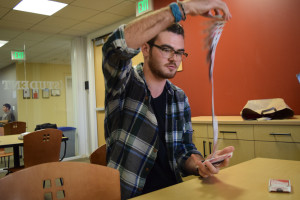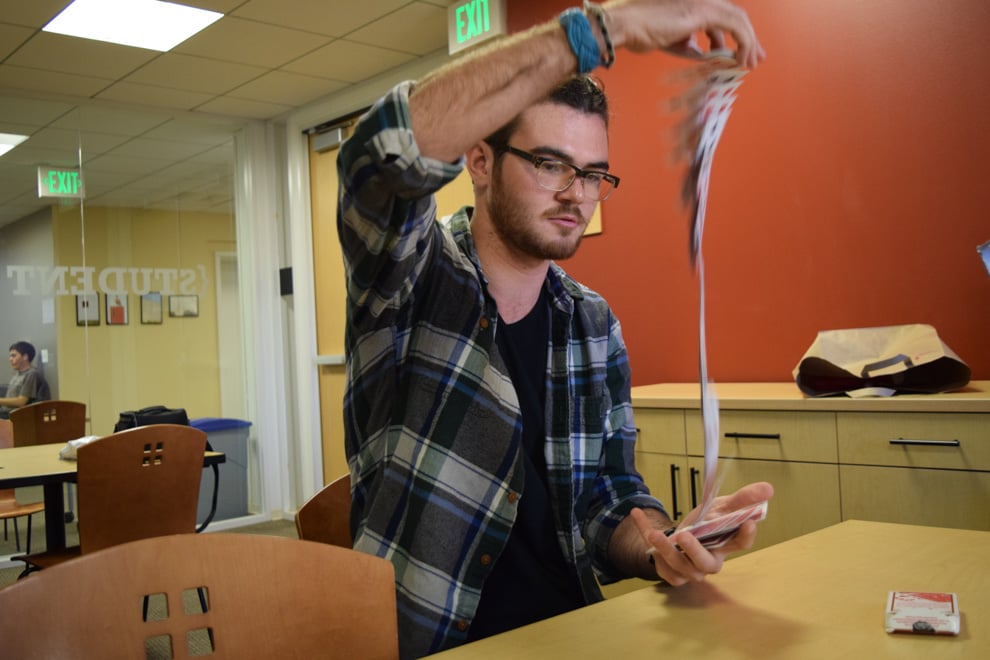If Stanford seemed a little more magical than usual last Friday, it might have been because of the inaugural meeting of a new club on campus. Welcoming veteran magicians and newcomers alike, the Stanford Magic Society (SMS) is now open for business, meeting at 3 p.m. on Fridays in Old Union.
The group was created by Drew Lexmond ’17, who got the idea for it after spending a quarter abroad at Oxford University as part of the Bing Overseas Studies Program. Oxford, apparently, has its own magic organization, which Lexmond joined while across the pond.

“It was a lot of fun just meeting up with a group of people with similar interests,” Lexmond said. “It just ended up being a bunch of people playing with cards, talking about magic… I learned a ton of stuff from them. I was inspired to create this society after my experiences there.”
At the first meeting, the participants practiced card flourishes and sleight of hand tricks — making sponge balls disappear, yanking a ring off of a finger and the like. Only a handful of people showed up, but, as of this weekend, the Stanford Magic Society’s Facebook group has 23 members.
“I want it to develop into something where we have new members,” Lexmond said. “People who know magic teaching newcomers basic stuff.”
Lexmond took a liking to magic from a young age. For Christmas one year, his parents tried to encourage his interests by gifting him with a magic set.
“All the gear was made of cheap plastic, and the tricks were really dumb,” he said, somewhat disappointedly.
Lexmond didn’t try magic again until his early teens, when a friend showed him how to do a card trick. Intrigued once again, he and some other friends began teaching themselves magic tricks, and he has continued his studies ever since. He even got an Undergraduate Advising & Research (UAR) Student Grant to perform street magic in the U.K., an experience that resulted in Lexmond performing on the street at the Edinburgh Festival Fringe, the largest arts festival in the world.
Elliot Shi ’19 said that he got into magic after seeing the movie “Now You See Me” with friends. At the meeting, he played with a pair of rubber bands that he appeared to melt together and pull apart.
“For me, [magic] is also a good way to establish a connection with someone that you don’t know,” Shi said. “There are a lot of different techniques to magic that are just really beautiful when you know the method, and you just feel really happy when you get away with it every time and people don’t notice. You can create an effect that looks impossible, but you know how it’s made possible.”
Lucas Roitman ’17 has been doing magic on-and-off for the last five years, and joined SMS so that he could practice more regularly. He also mentioned something called the “Magician’s Oath,” which requires that magicians not reveal the secrets of their tricks to non-magicians — and that they never perform these tricks themselves until they can perform it in such a way that maintains the illusion of magic.
“You should portray the trick very well,” Roitman elaborated. “If you do the trick badly, or if you do it and you, by mistake, show how it’s done… that’s against the honor code.”
Roitman, an entrepreneur, added that he hopes to use the performance aspects of magic in offstage ventures.
“What I’m mostly interested in is not just doing magic for magic’s sake, but trying to combine magic with other interests,” Roitman said. “In a business meeting, I can use a trick to call attention and get investors interested… or I can show a product in a better way.”
The trick in question is to pull out a wallet, which promptly bursts into flame. Roitman then slams the wallet shut, putting out the fire, and produces a business card from the same wallet — apparently uncharred.
Lexmond’s trick of choice is the “cups and balls” trick, which begins with three metal cups on a table along with three balls that vanish and reappear under the cups. If done properly, the trick ends with an assortment of oversized fruits (including a melon) on the table, seemingly pulled out of nowhere.
Perhaps he will teach it to his fellow magicians as they get more experienced, or they may try to learn something new altogether. The group expressed a common interest in coin magic, but the members also talked about mentalism — a psychic field of magic that encompasses hypnosis, cold reading and mental forcing.
At this inaugural meeting, however, they had more than enough fun one-upping each other with decks of cards.
“Sometimes the simple things blow you away,” Lexmond said.
Contact Jacob Nierenberg at jhn2017 ‘at’ stanford.edu.
